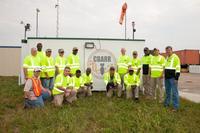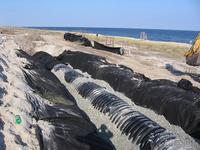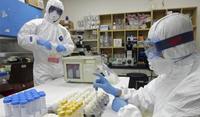-
Same-day water test keeps beaches open, swimmers’ health protected

With warm summer days at the beach on the minds of millions of winter-weary people, scientists are reporting that use of a new water quality test this year could prevent unnecessary beach closures, while better protecting the health of swimmers.
-
-
Nanobiotechnology kills listeria, other food-borne pathogens, dead
Researchers, using nature as their inspiration, successfully attached cell lytic enzymes to food-safe silica nanoparticles, and created a coating with the demonstrated ability selectively to kill listeria — a dangerous foodborne bacteria that causes an estimated 500 deaths every year in the United States. The coating kills listeria on contact, even at high concentrations, within a few minutes without affecting other bacteria.
-
-
Genetically engineered multi-toxin crops make insects insecticide-resistant
The popular new strategy of planting genetically engineered crops that make two or more toxins to fend off insect pests rests on assumptions that do not always apply, researchers have discovered. Their study helps explain why one major pest is evolving resistance much faster than predicted and offers ideas for more sustainable pest control.
-
-
New foot-and-mouth vaccine shows promise
The 2001 foot and mouth outbreak in Britain was devastating and cost the economy billions of pounds in control measures and compensation. One recommendation in a Royal Society report following the epidemic recommended the development of new approaches to control the virus. Scientists have used a new method to produce a vaccine which does not rely on inactivating the live, infectious virus which causes the disease — and is therefore much safer to produce.
-
-
More than 10,000 pesticides approved by EPA without rigorous review
Congress allowed the Environmental Protection Agency (EPA) to use what is called “conditional registration” to approve pesticides deemed especially beneficial for food production – even before all the toxicity tests have been completed. Congress intended conditional registration to be used only sparingly, but the EPS has been using the loophole in a wholesale fashion to approve 65 percent – or more than 10,000 – of the 16,000 pesticides submitted to it for approval. The EPA cannot easily track the history of conditionally approved pesticides to determine whether required toxicity data was submitted, whether that caused a dangerous use of a pesticide to be cancelled, or whether the uses or restrictions should be modified based in such data.
-
-
Focusing on climate’s impact on fisheries leads to misguided conclusions
In the early 1940s, California fishermen hauled in a historic bounty of sardine at a time that set the backdrop for John Steinbeck’s novel Cannery Row. By the end of the decade, however, the nets came up empty and the fishery collapsed. Where did they all go? A new study argues that the problem in seeking answers to this – and similar – questions lies in the fact that researchers typically try to find the answers by focusing on one factor at a time. What is the impact of climate on sardines? What is the effect of overfishing on sardines? Focusing on single variables in isolation can lead to misguided conclusions, the authors of the study say. The authors argue that climate, human actions, and ecosystem fluctuations combine to influence sardine and other species populations, and therefore such factors should not be evaluated independently.
-
-
Predicting disease outbreaks to protect soldiers -- and civilians
Researchers from Johns Hopkins University and the Pentagon develop a new method to predict dengue fever outbreaks several weeks before they occur. The method extracts relationships between clinical, meteorological, climatic, and socio-political data. It can be used in any geographical region and extended to other environmentally influenced infections affecting public health and military forces worldwide. DoD is currently evaluating the method for use in mitigating the effects of infectious disease in various operational settings.
-
-
First botulism antitoxin approved for neutralizing all seven known botulinum serotypes
The U.S. Food and Drug Administration on Friday announced that it has approved Botulism Antitoxin Heptavalent to treat patients showing signs of botulism following documented or suspected exposure to botulinum neurotoxin. The product, which is derived from horse plasma, will be stored in Strategic National Stockpile for emergency preparedness and responses.
-
-
Understanding the threat of invasive species

Catching rides on cargo ships and fishing boats, many invasive species are now covering the U.S. shorelines and compromising the existence of American native marine life. Once invasive species arrive in their new location, they begin multiplying, and in some cases, overpowering the local marine life.Researchers examine what factors allow some invasive species to survive in their new environments and others to fail.
-
-
Growing challenges to global food security
A new report highlights issues surrounding global food systems and the importation of food into the United Kingdom. One contributor to the study says: “Global food security, and ensuring food is socially, economically and environmentally sustainable, is perhaps the most important societal issue we face. Disruptions to food supply has serious knock-on effects; economically, socially and to the health and well-being of the population.”
-
-
NOAA predicts drought, flooding, warm weather for spring
The U.S. National Oceanic and Atmospheric Agency (NOAA) yesterday issued the three-month U.S. Spring Outlook, saying Americans should brace themselves for the following: above-average temperatures across much of the continental United States, including drought-stricken areas of Texas, the Southwest, and the Great Plains. These areas, and Florida, will see little drought relief owing to below- average spring precipitation. River flooding is likely to be worse than last year across the country.
-
-
U.S. Army helps in chemical testing of meat product

When a South Dakota beef producer voiced concerns over the safety of its product to a meat inspection staff, the Animal Disease Research and Diagnostic Laboratory at South Dakota State University, called on the U.S. Army Research, Development and Engineering Command’s chemical-biological center (ECBC) – and the ECBC answered.
-
-
Hidden dune filters treat coastal stormwater runoff

When it rains, untreated stormwater can sweep pollutants into coastal waters, potentially endangering public health. Now researchers have developed low-cost filtration systems that are concealed beneath sand dunes and filter out most of the bacteria that can lead to beach closures.
-
-
Loss of summer rains lead to long droughts in southwest U.S.
Long-term droughts in southwestern North America often mean failure of both winter and summer rains, according to new research. The finding contradicts a commonly held belief regarding the region — that a dry winter rainy season is generally followed by a wet summer season, and vice versa. In fact, when severe, decades-long droughts have struck the area in centuries past, both winter and summer rains generally were sparse year after year.
-
-
New, drug-resistant pandemic swine flu may go global

Health experts in Australia have expressed concerned about the threat of a new type of drug-resistant pandemic flu which is circulating in the population at large. These experts say that the new strain of swine flu has learned how to dodge the antiviral Tamiflu. While it is still rare, it is now spreading outside of hospitals. U.K. health officials, who have already recorded eight cases of the new strain in the United Kingdom, agree with their Australian counterparts that the new virus has the potential to turn global.
-
More headlines
The long view
We Ran the C.D.C.: Kennedy Is Endangering Every American’s Health
Nine former leaders of the Centers for Disease Control and Prevention (CDC), who served as directors or acting directors under Republican and Democratic administrations, serving under presidents from Jimmy Carter to Donald Trrump, argue that HHS Secretary Roert F. Kennedy Jr. poses a clear and present danger to the health of Americans. He has placed anti-vaxxers and conspiracy theorists at top HHS positions, and he appears to be guided by a hostility to science and a belief in bizarre, unscientific approaches to public health.
